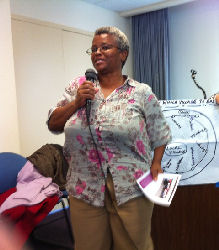 In 1956, at only 10 years of age, Sizani saw firsthand the detrimental effects of gender bias and the unjustified strain it puts on women. Sizani’s father was a migrant worker in Johannesburg, only returning home two weeks of the year during the festive season and the house was managed by Sizani’s mother. Once while Sizani’s father was away, and the house was obviously managed by her mother, his brother approached Sizani’s mother, demanding that she leave and give him the house and land. She, after all, was a woman and could not own or live on a piece of land by herself. He told her to find another man to live with because this house was now his. Forcibly evicted, she went to the only person she knew that could help.
In 1956, at only 10 years of age, Sizani saw firsthand the detrimental effects of gender bias and the unjustified strain it puts on women. Sizani’s father was a migrant worker in Johannesburg, only returning home two weeks of the year during the festive season and the house was managed by Sizani’s mother. Once while Sizani’s father was away, and the house was obviously managed by her mother, his brother approached Sizani’s mother, demanding that she leave and give him the house and land. She, after all, was a woman and could not own or live on a piece of land by herself. He told her to find another man to live with because this house was now his. Forcibly evicted, she went to the only person she knew that could help.
This whole situation was and is still exacerbated by the fact that the pieces of legislation and policies like the Bantu Administration Act of 1927 (section 11 (3) deemed wives in customary marriages to be minors and subject to their husband’s guardianship. They could not own property or enter into any contract or even open a bank account in their own right. Women had to be represented by their male relatives.
This provision has been repealed, but its legacy remains. The position is worse in the province of KwaZulu-Natal where Sizani was born and brought up; customary marriages were not governed by the Bantu Administration Act, but by the Code of Zulu law which prevented the indigenous women from being able to acquire property in their own names: they remain legal minors, subject to their husbands’ guardianship. Some of these pieces of legislation have been repealed but its legacy still haunts the women and girls especially in terms of their land and property rights and their right to enter into any contract.
Sizani accompanied her mother to approach the chief, asking for his help and requesting that he ffulfil his duty to look after the health of a community. They told their story, the cruel behaviour of their family member and their stranded situation. After hearing this series of unjust events, he replied, “Mama Ngubane, I wish your daughter was your son, I would be allocating land to you now. But because she is a girl and your eldest son is still too young I am sorry I am unable to allocate land to you in your own right as a woman.” They were refused. Sizani, her mother and four younger siblings were homeless, unable to take any possessions from their former home and were forced to seek refuge at aunt’s house.
Her mother moved into her auntie’s home. Two years later Sizani’s mother wrote to a young male marital family member, asking him to stand on her behalf so she could acquire a piece of land. Because the Bantu Administration Act of 1927 and the Bantu Authorities Act of 1951 stated that all indigenous women were considered minors they could therefore not own property. Sizani’s mother needed a man in order to move out of her aunt’s house, she needed a man in order to move forward, and she needed a man in order to have control over the future of her children. She did not have autonomy. Sizani’s family got their new home made up of wood, mud and corrugated iron on the roor, but the land technically belonged to their young male relative, who could lawfully evict them and claim the property at any time. Sizani knew this was unfair and promised herself that when she grew up she would do something to help stop it.
Read the whole story.


